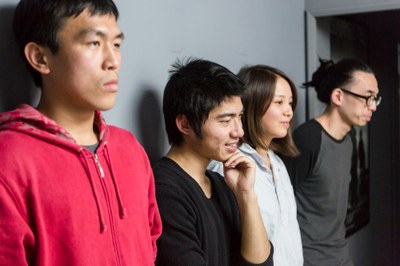
《錢江衍派》
廖烜榛、黃奕捷、李佳泓、王又平
首展日期|2016/01/23 - 2016/03/06
首展地點|台南絕對空間
入圍理由
與其說《錢江衍派》是由四位年輕藝術家王又平、李佳泓、黃奕捷、廖烜榛共同拍攝的一部「電影」,毋寧說,這部電影的產生本身即為一場橫跨了世代與世代、個體與集體記憶間的事件。該片腳本圍繞著橫跨文學、繪畫等領域的政治行動者施明正,然而演員卻是四位年輕藝術家的父親,作為子女的藝術家藉著與父執輩進行對話以產製出一部劇情片,但這些父親不僅並非職業演員,更非政治受難者,在演出過程中不經洩漏原本的身份,當表演岔出敘事,演員的身份回返為父親,這些縫隙不僅揭露了日常的歷史,也成為整個計畫最具觸情力之處。(主筆/簡子傑)
關於《錢江衍派》
《錢江衍派》是一項由四名藝術家與四個家庭共同合作的電影計畫,這項計畫的發想源自於參與社會運動的經驗。四名藝術家在參與太陽花運動的過程中發現,家人雖然都肯定近代民主政治的發展,卻對於當今的社會運動有著諸多疑慮 ; 此外,即便父母成長於社運蓬勃發展的80年代,當年卻也都不曾親身參與其中。四名藝術家決定透過「拍電影」來和家人一同追溯這段過往,並藉此溝通彼此不同的想法,他們將監獄文學作家施明正的小說和生命經驗改編為劇本,而家人們則在片中飾演戒嚴時期的異議份子 ; 然而,家人們卻在電影的拍攝過程中漸漸地進入了自己的回憶,成了各自生命故事的回顧與反思,最後的電影則呈現了這段家人之間互動的過程。
這項計畫將電影作為翻轉現實關係的溝通平台,藉此在家庭內打開過往被閉鎖的話語。一方面,嘗試在「少數經驗」的重演中,重啟社會多數人與異己間的協商 ; 另一方面,則面對了家庭內部溝通的不可能性。
關於人物
《錢江衍派》是由四名年輕創作者與各自家庭所共同合作的電影計畫,發想來自創作者參與社會運動的經驗。四名創作者將作家施明正的小說和生命經驗改編為劇本,邀請彼此的父親飾演戒嚴時期的異議份子。出乎意料的是,父親們卻在電影拍攝過程中逐漸攤開回憶,吐露了不曾與孩子談過的事蹟片段,劇情遊走於虛構文本與真實自我之間,使影片不只描述施明正其人其事,亦呈現創作者與家人之間的互動過程。
片名《錢江衍派》是施氏的家族堂號。台灣各地古厝時常可在正屋上方看見「某某衍派」四字,標誌著家族淵源和血緣的流傳,而作為電影片廠的彰化埔鹽施氏古厝剛好是其中一名創作者的祖厝,祖厝正屋門楣上的匾額寫著「錢江衍派」四字,也呼應了施明正本人的施姓,遂用作片名。
四位創作者為國立台北藝術大學美術系同學,2013年,他們展開首次家庭創作計畫,和家人討論自己心中的藝術以及創作。2014年3月,太陽花運動爆發,他們開始思考社會運動和藝術的關聯,著手構思劇本並於同年年底閱讀到施明正的著作;2015年3月,劇本完稿,決定找各自的父親來飾演片中角色。這部影片不只是施明正的故事,更是和家人溝通政治理念的契機。他們說,「寫劇本的前三年,我們一直思考社會運動和藝術事件的關聯,到底面對政治議題的藝術能還有什麼行動的可能 ?」認為許多議題至今仍未解決,各自的生活與價值觀和家人之間也有距離。《錢江衍派》便是在處理這種距離。「太陽花運動時,父母對我們的參與幾乎都是正向看待的,反而讓我們開始好奇為何八〇年代社會運動風起雲湧,父母卻缺席了」,創作者企圖利用政治議題來面對家庭問題,希望能跨越彼此世代的理念鴻溝。
邀請自己的父母演出跟受薪演員不同,讓整個拍攝過程超乎預期,面對至親這層特殊關係,也讓許多隱而未顯的難言之隱被攤開來談,「家庭壓抑了很多話語和情緒,甚至始終是壓力來源,擺脫不了父子關係;但進入片場,我們成了導演和演員的關係,倫理關係暫時被打破,在過程中彼此攤牌」。創作者逐漸理悟父母並不只是父母,也是有過往故事的人,也許他們自認故事不具渲染力,但透過鏡頭反而使故事變得獨特,能和他人共鳴。鏡頭重新凝視逐漸老去的父母,在了解彼此的過程中也更明白家人之間的「疙瘩」從何而來。拍攝過程中充滿協商、對立與衝突,冗長的說服與質疑讓這計畫不斷衍生次文本,「我們對家庭丟出問題也製造了事件,但在日常的家庭倫理中製造創作所需的衝突其實相當困難,更別說是和解」。
四位創作者先訪問各自的父母八〇年代的生活經驗及對政治的想法,再把蒐集的素材和施明正故事寫成劇本。但拍攝期間父母都忙於工作,沒空看劇本,更別說要素人演員演出角色深度內涵;創作者把重點放在重建場景,讓父母能有所依據;「我們擺了很多八〇年代的物件,讓父母透過物件回憶自己的八〇年代。簡單的角色設定,每場戲幾乎都花一兩個小時慢慢拍,讓父母一邊說台詞,一邊把自己主觀的話語參雜其中,過程中提供他們一個參照過往經驗的管道。我們感覺自己好像在重塑歷史,一段被壓迫的多數人歷史,第一代台灣中產階級的翻身歷史」。創作者企圖透過和父母同輩的施明正之其人其事,把各自的政治立場放進劇本,從而瞭解到父母親在八〇年代忙於生活,撫育孩子而無法親身參與政治,成了沒故事的人;也就是說,「透過施明正,我們試圖拍出對政治有些恐懼又抗拒的父母輩故事,既聆聽父母說故事,也讓我們了解自己是誰」。

廖烜榛、黃奕捷、李佳泓、王又平
廖烜榛,生於1993年,高雄,台灣。
黃奕捷,生於1992年,台南,台灣。
李佳泓,生於1992年,台中,台灣。
王又平,生於1993年,台北,台灣。
四人為大學同儕,2015年畢業於台北藝術大學美術系,現活動於台北,台灣。 2013年起,四人便數度與同儕、家人合作創作計畫,嘗試在藝術生產的實作中發展與「異見」對話的工作方法。作品以行為表演、錄像、計畫型創作為主,包含:《生伙計畫—家庭洄游》、《澄橙》、《錢江衍派》、《中國城大戲院》等。
作品相關評論
寫在一個學運世代的畢業前夕─藝術家雜誌第493期
以溝通為創作核心,與老爸一起拍電影─湃思紀2016/03/01
錢江衍派:年輕藝術家以和解取代對抗的社會反思和解取代對立─藝術家雜誌492期
製作團隊
藝術家 / 導演|廖烜榛、黃奕捷、李佳泓、王又平
主演|廖燈炎、黃南洋、李坤明、王志敏
美術|陳慶銘
音效|林奕碩
配樂|林奕碩、陳以德
場務|徐筠婷、黃奕翔
翻譯|謝東霖
校稿|黃冠維
--------------------------------------------------------------------------------------------------------------------------------------------------------
Time Splits in the River
LIAO Xuan-Zhen, HUANG I-Chieh, LEE Chia-Hung, WANG Yu-Ping
Comments from Nomination Committee
Instead of describing Time Splits in the River as a "film" co-created by four young artists, WANG Yu-Ping, LEE Chia-Hung, HUANG I-Chieh, and LIAO Xuan-Zhen, I would rather say that the production of the film is an event that spans two generations as well as individual and collective memory. The script evolves around SHI Ming-Zheng, a political activist in the fields of literature and painting, but the actors are the fathers of the young artists. As the children, the artists conduct dialogues with their fathers to create a drama film. However, the fathers are neither professional actors nor political victims, and cannot help but expose their identities in the process. When the performance digresses and gives space for other narratives, the actors become fathers again, and the narrative cracks not only reveal the past of their everyday life, but also become the most precious thing in the entire project. (Commentator: JIAN Tzu-Chieh)
About the Artwork
Time Splits in the River is a collaborative movie project created by four artists and four families. The conception of the project originated from the artists’ involvement in a social movement. While taking part in Taiwan’s Sunflower Movement, the four artists realized that their families are quite hesitant about today's social movements despite them being in agreement with Taiwan’s modern democratic progress. Furthermore, although their parents grew up in the 1980s when social movements flourished, they had never participated in any. The four artists then decided to use filmmaking to trace back to this period in time with their families and to use the opportunity to communicate with each other. They have created a screenplay by adapting a novel by writer and political prisoner SHIH Ming-Cheng, with dissidents from the martial law period portrayed by members of their families. As the plot advances, their families also begin to slowly become entangled in their own past, with the film capturing the recollection and introspection of their own lives. The process of the families’ interactions is then ultimately presented in the film.
The project employs film as a communication platform to subvert relations in life and to spark dialogues that have been avoided in the past amongst the artists' families. On the one hand, through reenacting these social minority’s experiences, the film reintroduces conversations between the social majority and dissidents; on the other hand, it exposes the impossibility of internal family communication.
About the Artist
LIAO Xuan-Zhen was born in 1993, Kaohsiung, Taiwan.
HUANG I-Chieh was born in 1992, Tainan, Taiwan.
LEE Chia-Hung was born in 1992, Taichung, Taiwan.
WANG Yu-Ping was born in 1993, Taipei, Taiwan.
Being classmates, the four members all graduated from the Department of Fine Arts, Taipei National University of the Arts, and are now based in Taipei, Taiwan. Since 2013 onward, they have initiated several artistic projects with their peer artists and family members, attempting to develop in and from these projects a more communicative creativity that enables dialogues with "dissidents." Their works range from performance art, film, to art project, including: Project on Fire: Families’ Migration, Graveside, Time Splits in the River, Chinatown Theater, etc.
